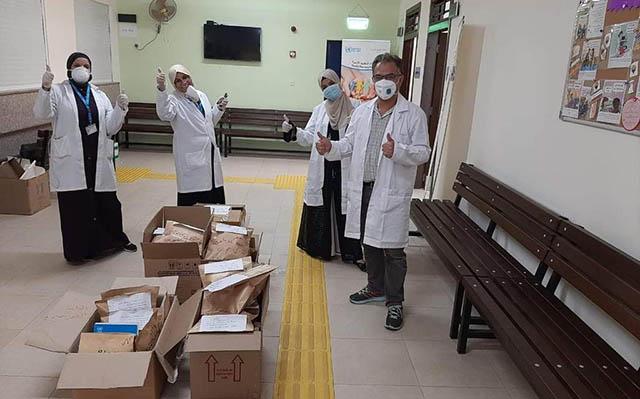- Local News
- Thu-2020-04-23 | 04:22 pm

The dialogue was attended by a number of Arab and world top diplomats, in addition to UNRWA Commissioner-General Philippe Lazzarini, the Jordan News Agency, Petra, reported.
Safadi stressed that the agency needs support in order to conduct its tasks under its international mandate until a just solution to the Palestine refugee issue is reached in accordance with international legitimacy resolutions, according to a Foreign Ministry statement.
The desired solution to the Palestinian-Israeli conflict must be comprehensive and based on the two-state solution, which guarantees the establishment of an independent Palestinian state with Jerusalem as its capital along the June 4, 1967 lines, he said.
Facing the repercussions of the coronavirus pandemic has posed an additional challenge for UNRWA, which provides vital health, education and relief services to millions of refugees, he said, adding that quick and effective action must be taken to bridge the funding gap in the agency's budget and meet its needs for confronting COVID-19.
The minister also warned of the catastrophic consequences of any Israeli decision to annex the Jordan Valley and the settlements in occupied Palestine, stressing that Israel’s taking this illegal step would "kill the two-state solution” and undermine all chances of achieving a just peace accepted by the parties involved.
Safadi stressed the need for the international community to take a "decisive stance” rejecting and preventing any Israeli move to annex occupied lands.
A statement issued by the meeting also stressed the importance of continuing to provide adequate political and financial support to UNRWA to ensure the continuity of its vital services in accordance with its international mandate until a lasting and just solution to the refugee issue is reached.
The statement stressed that the desired solution must be in accord with relevant UN resolutions, including the UN General Assembly’s Resolution 194, and offer a comprehensive solution to the Palestinian-Israeli conflict based on the two-state solution.
UNRWA's programmes and basic services are provided to more than 5.6 million Palestinian refugees in its five areas of operation, including East Jerusalem, the statement said.
The statement drew attention to the "great international support” received by the UN General Assembly’s resolution to renew the agency's mandate in December, which was voted for by an overwhelming majority.
Participants stressed the need to translate that political support into financial support to enable UNRWA to continue providing its basic services to Palestinian refugees efficiently and without interruption.
Participants also expressed their full support for the efforts of the newly appointed UNRWA Commissioner-General Philippe Lazzarini, noting appreciation for his plans to empower the agency.
Regarding the coronavirus crisis, participants highlighted the need to support UNRWA's response plan pertaining to the effects and consequences of the pandemic, including financial support for the agency's urgent appeals.
They called for renewing international commitment to UNRWA for 2020 and beyond, in order to ensure its ability to continue providing its educational, health and other services to refugees, while defending and protecting their rights in accordance with its mandate.
They also urged donors to support UNRWA financially, including through multi-year pledges, and help it to meet its 2020 budget requirements, as well as mobilise adequate and sustainable financial support.
Participants discussed ways to help the agency diversify and expand its donor base and funding opportunities.
They also agreed to hold a donors conference during the coming period to consider ways to cover the agency's funding needs and finance its budget deficit.
Safadi voiced appreciation for Sweden's "great role” in garnering international support for UNRWA









